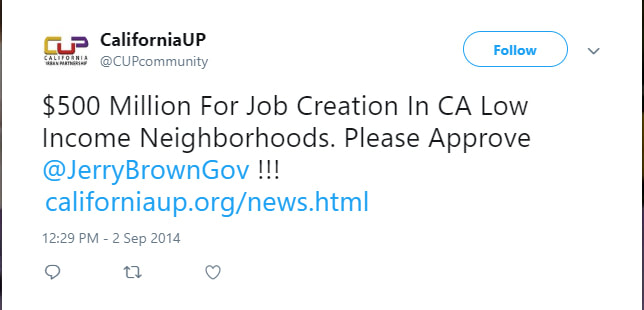$500 MILLION FOR JOB CREATION IN LOW INCOME NEIGHBORHOODS COULD BE RAISED IF GOVERNOR JERRY BROWN APPROVES PROGRAM

SEPTEMBER 2, 2014: This weekend the State Legislature passed the Urban Partnership's highest priority bill - a measure that would help community development entities (CDE) attract up to $500 million in private investment capital for job creation projects in California’s low-income neighborhoods. Assembly Bill 1399, co-authored by Assembly Members Jose Medina and V. Manuel Perez, would create a $200 million state New Markets Tax Credit (NMTC) program if Governor Jerry Brown signs it into law. Assembly Bill 1399 authorizes the Governor’s Office of Business and Economic Development (GO-Biz) to award tax credits to CDE’s. The CDE’s can then use the credits to raise capital from private investors for small business and community development projects such as facilities for non-profit organizations, light manufacturing, and mixed-use and transit-oriented development.
"Thanks to the leadership of Assembly Members Medina and Perez, along with the action of grassroots community advocates across California, investment firms and financial institutions, we are closer than ever before to real economic inclusion,” said California Urban Partnership president Malaki Seku-Amen, who has advocated for a state NMTC program since 2005.
“Unlike 14 other states in America, California currently has no tools for low-income community populations to change their trajectory by gaining access to affordable and adequate private investment capital, which will help them participate meaningfully in the economy as entrepreneurs and agents of change,” Mr. Seku-Amen added.
While California’s unemployment rate has dropped significantly over the past 2 years to 7.8%, many Californians continue to suffer from the impacts of the 2006 Financial Crisis and 2010 global recession.
Within many low-income neighborhood census tracts in major urban centers (Oakland, Hayward, San Francisco, San Jose, Richmond, Sacramento, Fresno, Los Angeles, San Bernardino, Riverside and San Diego), unemployment rates for Blacks and Hispanics have hovered between 15 – 35% for over a decade (according to the U.S. Bureau of Labor Statistics).
These realities, coupled with the lack of economic development tools and strategies, negatively affect entire regions, strain public systems, and limit job creation and business expansion.
“A new markets program will go a long way to help California carve channels of capital from investors to entrepreneurs. This is indeed the most successful approach to job and wealth creation in America,” Mr. Seku-Amen declared.
Fourteen (14) other states have already adopted a NMTC program, on average leveraging 13 times more in federal monies than they allocated in planned revenue to fund the tax credit. According to a January 2011 case study prepared by Pacific Community Ventures on the NMTC program, for every dollar of forgone tax revenue, the NMTC leverages $12 to $14 of private investment.
"Thanks to the leadership of Assembly Members Medina and Perez, along with the action of grassroots community advocates across California, investment firms and financial institutions, we are closer than ever before to real economic inclusion,” said California Urban Partnership president Malaki Seku-Amen, who has advocated for a state NMTC program since 2005.
“Unlike 14 other states in America, California currently has no tools for low-income community populations to change their trajectory by gaining access to affordable and adequate private investment capital, which will help them participate meaningfully in the economy as entrepreneurs and agents of change,” Mr. Seku-Amen added.
While California’s unemployment rate has dropped significantly over the past 2 years to 7.8%, many Californians continue to suffer from the impacts of the 2006 Financial Crisis and 2010 global recession.
Within many low-income neighborhood census tracts in major urban centers (Oakland, Hayward, San Francisco, San Jose, Richmond, Sacramento, Fresno, Los Angeles, San Bernardino, Riverside and San Diego), unemployment rates for Blacks and Hispanics have hovered between 15 – 35% for over a decade (according to the U.S. Bureau of Labor Statistics).
These realities, coupled with the lack of economic development tools and strategies, negatively affect entire regions, strain public systems, and limit job creation and business expansion.
“A new markets program will go a long way to help California carve channels of capital from investors to entrepreneurs. This is indeed the most successful approach to job and wealth creation in America,” Mr. Seku-Amen declared.
Fourteen (14) other states have already adopted a NMTC program, on average leveraging 13 times more in federal monies than they allocated in planned revenue to fund the tax credit. According to a January 2011 case study prepared by Pacific Community Ventures on the NMTC program, for every dollar of forgone tax revenue, the NMTC leverages $12 to $14 of private investment.


